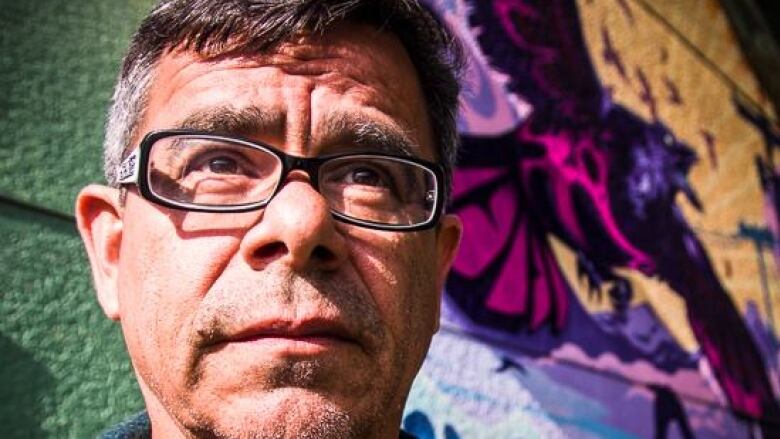Urban Indigenous people forgotten in UNDRIP talks, say advocates
Nearly 80 per cent of Indigenous people live off-reserve but have little representation in UNDRIP talks

City-dwellers are being left out of consultations about the implementation of the UN Declaration of Indigenous Peoples (UNDRIP) even though themajority of B.C.'s Indigenous people live in cities, according to the president of a group that advocates for urban Indigenous political interests in B.C.
Scott Clark, president of the Northwest Indigenous Council, says the majority of B.C.'s Indigenous people live in cities, yet their opinions and concerns are often not given as much weight as those living on reserves.
"[Seventy-eight]per cent of Indigenous people live off-reserve, but we're being ghosted by the powers that be," said Clark.
Last year, Clark says he tried attending a First Nations Leadership Council meeting with provincial government officials about UNDRIP, but was excluded.
According to Clark, the council is made upof on-reserve groups but has no off-reserve representation. He says the incident highlights a crucial gap in consultations. Clark says he's spoken to a council representative, and hopes to meet soon to discuss off-reserve interests.
In November, B.C. became the first jurisdiction in Canada to pass a law requiring the provincial government to align its policies and laws with the UN declaration.
According to Mtis lawyer Patricia Barkaskas, governments tend to consult with First Nations governing bodies or on-reserve umbrella groups like the B.C. Leadership Council. But urban Indigenous people have distinct concerns. Whether those concerns are included in consultations will determine how UNDRIP will apply to them.
"Governments, including Indigenous governments, have an opportunity to actually be accountable to Indigenous people in a way that includes all voices," Barkaskas said. "Anything less than that is going to be deeply flawed."
No land, but interests
UNDRIP consists of 46 articles ratified by the United Nations, and recognizes the basic human rights of Indigenous people and their rights to self-determination.
In December, a month after the B.C. legislature passed Bill 41, the federal Liberal government announced that it hoped to pass UNDRIP legislation by the end of this year.
Several UNDRIP articles revolve around land and traditional territory, including:
- Article 26.1: "Indigenous peoples have the right to the lands, territories and resources which they have traditionally owned, occupied or otherwise used or acquired."
- Article 19:Governments have an obligation to obtain Indigenous people's "free, prior and informed consent before adopting and implementing legislative or administrative measures that may affect them."
Why wouldn't our inherent rights to the environment be just as present if we live in an urban centre as if we live on what is ancestral and traditional territory.Patricia Barkaskas
But while urban Indigenous people don't live on their traditional lands, they still have inherent rights andspecific interests that should be accommodated in UNDRIP application, Barkaskas says.
More than 60,000 Indigenous people live in Metro Vancouver, many of them in East Vancouver. Collectively, they function similarly to an Indigenous community, and therefore should be consultedabout policy, culture and even the environment, says Barkaskas.
"Why wouldn't our inherent rights to the environment be just as present if we live in an urban centre as if we live on what is ancestral and traditional territory?" she said.
Also, Indigenous rights are inherent in Indigenous people, and aren't relinquished when those people leave their First Nations, Barkaskas says.
"Whether that community is in an urban space or notdoesn't diminish that inherent jurisdiction."
In an urban context, Clark said implementing UNDRIP could mean creating designated urban Indigenous representatives on city councils, school boards and parkboards.
Urban UNDRIP forums planned
In February, theNorthwest Indigenous Councilplans to host UNDRIP forums for urban Indigenous people in Victoria, Nanaimo and Courtenay. A report with final recommendations will be submitted afterwardto the Congress of Aboriginal Peoples and key federal and provincial ministers.
If Indigenous and non-Indigenous governments aren't going to accommodate the specific interests of urban Indigenous people, then they're discriminating against them, Clark says.
"We won't see real change until the governments start actively working with off-reserve representative organizations to fully implement those changes."












_(720p).jpg)


 OFFICIAL HD MUSIC VIDEO.jpg)
.jpg)



























































































